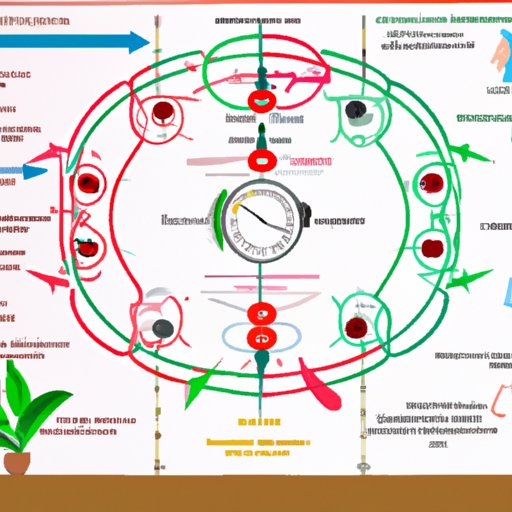Introduction
Understanding fertility after your period is an important part of reproductive health. While many people are aware of their menstrual cycle and the associated changes in hormones that occur before and during menstruation, they may not know what to expect from their fertility after their period. This article will explore the changes in hormones, ovulation, and timing and charting that can help you understand your fertility post-period and provide tips on how to naturally increase your fertility.

What to Expect From Your Fertility After Your Period
After your period ends, your body begins its cycle anew. During this time, your hormones prepare for ovulation, which is when a mature egg is released from one of your ovaries and travels down the fallopian tube. This process is known as the follicular phase of the menstrual cycle. It is during the follicular phase that your body produces more estrogen and less progesterone. This hormone shift triggers the release of luteinizing hormone, or LH, which signals the ovary to release an egg.

How to Know if You are Fertile Right After Your Period
It can be difficult to know exactly when ovulation occurs, but there are certain signs that can indicate that you are fertile right after your period. These include an increased amount of cervical mucus, which is secreted by the cervix to facilitate sperm movement; a slightly elevated basal body temperature; and a mid-cycle surge in LH. Additionally, some women experience mild cramping around the time of ovulation, which is known as mittelschmerz.
You can also use home ovulation tests to detect the presence of LH in your urine. These tests are typically most accurate if taken around the middle of your cycle. Additionally, there are fertility tracking apps available that can help you keep track of your cycle and predict when you are likely to be fertile.
The Impact of Hormonal Changes on Fertility After Your Period
Hormonal changes play a key role in determining your fertility after your period. As mentioned above, estrogen and progesterone levels rise and fall throughout the cycle, with estrogen peaking just before ovulation and progesterone increasing after ovulation. This hormone balance is necessary for successful ovulation and conception.
In addition, the release of luteinizing hormone (LH) is necessary for the release of an egg. LH levels typically peak in the middle of the cycle, usually 12-48 hours before ovulation occurs. Knowing when your LH surge takes place can help you determine when you are most likely to be fertile.

Understanding Ovulation and Fertility After Your Period
The length of your menstrual cycle can vary depending on your age and other factors, but most cycles last between 21 and 35 days. The average ovulation window, or the time during which you are most likely to become pregnant, is usually 14 days before the start of your next period. Therefore, if your cycle is 28 days long, your ovulation window would begin on day 14 and end on day 28.
It is important to note that the timing of your ovulation window can vary from cycle to cycle and may even occur earlier or later than expected. Therefore, it is important to track your cycle and look for signs of ovulation to accurately predict when you are most likely to be fertile.
Using Timing and Charting to Determine Your Fertility After Your Period
Timing and charting your menstrual cycle can help you understand your fertility after your period. One way to do this is to take your basal body temperature every morning. Basal body temperature is your body’s temperature at rest and can be used to predict ovulation. A small rise in temperature usually indicates that ovulation has occurred.
In addition to taking your temperature, you can also pay attention to changes in your cervical mucus. During ovulation, your cervical mucus becomes thinner, clearer, and more slippery, which can help sperm travel to the egg. Lastly, you can use ovulation predictor kits, which test your urine for the presence of LH to help you determine when you are most likely to be fertile.
How Long it Takes for Your Fertility to Return After Your Period
The amount of time it takes for your fertility to return after your period can vary depending on a variety of factors, such as age, lifestyle, and health. Generally, it takes about two weeks for your body to go through the entire cycle and be ready for ovulation again. However, if you have just had a baby, it can take up to six months for your fertility to return to normal.

Exploring Natural Ways to Increase Fertility After Your Period
There are several natural ways to increase your fertility after your period. Eating a balanced diet rich in fruits, vegetables, whole grains, and lean proteins can help support your reproductive health. In addition, regular exercise and stress reduction can help decrease inflammation in the body and improve overall health. Taking certain supplements, such as omega-3 fatty acids, vitamin D, and folic acid, can also help boost fertility.
Conclusion
Understanding your fertility after your period is an important part of reproductive health. This article explored the changes in hormones, ovulation, and timing and charting that can help you understand your fertility post-period, as well as natural ways to increase your fertility. By paying attention to these factors and making healthy lifestyle choices, you can increase your chances of conceiving.
If you are trying to conceive, we recommend speaking to your doctor to discuss the best ways to increase your fertility. Additionally, doing further research on fertility and reproductive health can help you make informed decisions about your health.
(Note: Is this article not meeting your expectations? Do you have knowledge or insights to share? Unlock new opportunities and expand your reach by joining our authors team. Click Registration to join us and share your expertise with our readers.)
